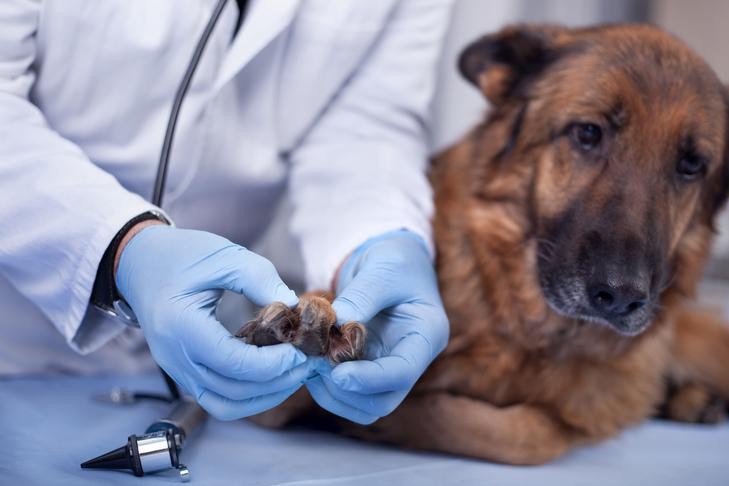It’s a common sight for many dog owners: your beloved canine companion diligently licking their paws. While occasional grooming is perfectly normal, excessive or frequent paw licking can be a sign that something is amiss. Just like humans, dogs use self-grooming as a way to keep themselves clean, but when this behavior becomes persistent, it’s crucial to understand the underlying reasons. From simple irritants to more complex health issues, several factors can drive a dog to lick their feet. Understanding these causes is the first step in addressing the problem and ensuring your dog’s well-being.
Common Reasons for Dog Paw Licking: From Injuries to Allergies
If you’ve noticed your dog constantly licking their paws, it’s natural to wonder, “Why Do Dogs Lick Their Feet so much?”. The reasons are varied and can range from physical discomfort to behavioral issues. Let’s explore the most common causes behind this behavior.
Injuries and Foreign Objects
One of the most immediate reasons for sudden and focused paw licking is injury. If your dog starts licking one paw intensely and abruptly, the first thing to do is to carefully examine their paws. Dogs explore the world with their feet, and this can unfortunately lead to minor injuries.
- Cuts and Lacerations: Sharp objects encountered during walks can cause cuts on the paw pads or between the toes. These can be painful and trigger licking as a way for the dog to soothe the area.
- Torn Nails: Rough play or catching a nail can result in tears or breaks, causing significant pain and licking.
- Foreign Objects: Thorns, splinters, pebbles, or even small pieces of glass can become lodged in the paw pads or between the toes. These irritants will cause discomfort and prompt your dog to lick in an attempt to remove them.
- Burns: Hot pavement in the summer or salted sidewalks in winter can burn paw pads, leading to pain and licking. Chemical burns from household cleaners or garden products are also possible.
- Insect Stings or Bites: Bee stings, wasp stings, or insect bites on the paw can cause localized pain, swelling, and itching, resulting in licking.
Alt text: Veterinarian carefully examining the paw of a German Shepherd dog during a check-up, looking for signs of injury or irritation.
If you suspect an injury, gently clean the paw with mild soap and water and check for any visible wounds or foreign objects. Minor issues might be resolved with basic first aid, but deeper cuts, embedded objects, or signs of infection warrant a veterinary visit.
Dermatitis and Skin Conditions
If no visible injury is apparent, the licking could stem from dermatitis, a general term for skin inflammation. Skin conditions are a frequent culprit behind persistent paw licking in dogs.
- Allergic Dermatitis: Just like humans, dogs can develop allergies to various environmental substances. Common allergens include pollen, dust mites, mold spores, grasses, and weeds. When these allergens come into contact with a dog’s skin, it can trigger an allergic reaction, leading to intense itching, especially in areas like the paws.
- Contact Dermatitis: Irritants in the environment can also cause skin reactions. These can include chemicals in lawn fertilizers, pesticides, cleaning products, and even certain types of grass. Contact dermatitis often manifests as redness, itching, and inflammation of the paws.
- Food Allergies: While less common than environmental allergies, food sensitivities can also manifest as skin issues, including itchy paws. Certain proteins or grains in dog food can trigger allergic reactions, leading to skin irritation and licking.
- Bacterial or Yeast Infections: Moisture trapped between the toes or in skin folds can create a breeding ground for bacteria and yeast. These infections can cause intense itching, redness, and a characteristic musty odor, prompting persistent licking.
Regularly cleaning your dog’s paws, especially after outdoor excursions, can help minimize exposure to allergens and irritants. Using dog-specific shampoos and avoiding harsh chemicals around your dog can also contribute to healthy skin and reduce the likelihood of dermatitis.
Parasites and Infestations
External parasites are another common reason why dogs might excessively lick their paws.
- Fleas: Flea bites are notoriously itchy, and while fleas can affect the entire body, dogs often focus their scratching and licking on their paws and legs. Flea allergy dermatitis, a hypersensitivity to flea saliva, can exacerbate the itching and lead to intense paw licking.
- Mites (Mange): Different types of mites can cause mange in dogs, leading to intense itching, hair loss, and skin lesions. Sarcoptic mange, in particular, is highly contagious and causes severe itching, often prompting dogs to lick and chew at their paws relentlessly.
- Ticks: While less likely to cause widespread itching, tick bites can be irritating and lead to localized licking, especially if the tick attaches to the paw area.
Regular parasite prevention is crucial for maintaining your dog’s comfort and health. Consult your veterinarian about the best flea, tick, and mite prevention strategies for your dog based on your location and lifestyle.
Pain and Underlying Medical Conditions
Sometimes, paw licking is a way for dogs to cope with pain, even if the source of the pain isn’t directly in the paw itself.
- Arthritis and Joint Pain: Dogs with arthritis or other joint problems may lick their paws as a way to soothe the discomfort. While the pain might be in their joints, the licking can be a generalized response to overall discomfort.
- Neuropathic Pain: Nerve pain, which can result from various conditions, can also trigger paw licking. The licking might be an attempt to relieve tingling, burning, or other unusual sensations in the paws.
- Internal Pain: In some cases, dogs may lick their paws as a displacement behavior when experiencing pain elsewhere in their body. It’s a way for them to focus their attention and anxiety related to the pain.
If your dog exhibits persistent paw licking without any obvious skin issues or injuries, it’s important to consider underlying pain or medical conditions. A thorough veterinary examination can help identify any hidden health problems contributing to this behavior.
Behavioral Issues: Boredom and Anxiety
When physical causes are ruled out, behavioral factors can be the reason behind excessive paw licking.
- Boredom: Dogs who are not getting enough physical exercise or mental stimulation may develop paw licking as a way to occupy themselves. It can become a repetitive habit developed out of sheer lack of activity.
- Anxiety and Stress: Just like humans, dogs can experience anxiety and stress. Paw licking can be a self-soothing behavior for anxious dogs. Separation anxiety, noise phobias, or changes in the home environment can trigger anxiety-related paw licking.
- Compulsive Behavior: In some cases, paw licking can become a compulsive behavior, similar to obsessive-compulsive disorder in humans. This can develop from underlying anxiety or stress and become a deeply ingrained habit that is difficult to break.
Alt text: Close-up portrait of a sad Cavalier King Charles Spaniel puppy lying down indoors, conveying feelings of loneliness or anxiety.
Addressing behavioral paw licking requires identifying and managing the underlying cause. Increasing exercise, providing puzzle toys and mental enrichment, and creating aCalming and predictable environment can help alleviate boredom and anxiety. In some cases, consulting a certified animal behaviorist may be necessary to address compulsive paw licking or severe anxiety.
Secondary Infections: A Vicious Cycle
Regardless of the initial cause, persistent paw licking can lead to secondary complications. The constant moisture from licking can break down the skin’s natural defenses and create a perfect environment for bacterial and yeast infections to develop. These secondary infections further exacerbate itching and irritation, leading to even more licking, creating a frustrating and uncomfortable cycle for your dog. Recognizing and treating secondary infections promptly is crucial to break this cycle and provide relief.
When to Consult a Veterinarian
Occasional paw licking as part of grooming is normal dog behavior. However, if you notice any of the following, it’s time to consult your veterinarian:
- Sudden onset of excessive licking.
- Licking focused on one paw.
- Redness, swelling, or discharge on the paw.
- Limping or changes in gait.
- Persistent licking that doesn’t improve with home care.
- Behavioral changes alongside paw licking, such as restlessness or hiding.
Your veterinarian can perform a thorough examination to determine the underlying cause of your dog’s paw licking. They may recommend allergy testing, skin scrapings, blood work, or other diagnostic tests to reach an accurate diagnosis and recommend the most effective treatment plan. Early intervention is key to preventing secondary infections and ensuring your dog’s comfort and well-being.
In conclusion, understanding why dogs lick their feet involves considering a range of potential causes, from physical injuries and skin conditions to parasites, pain, and behavioral factors. By carefully observing your dog’s behavior and seeking veterinary guidance when needed, you can effectively address the issue and help your furry friend live a happier, more comfortable, and less itchy life.

